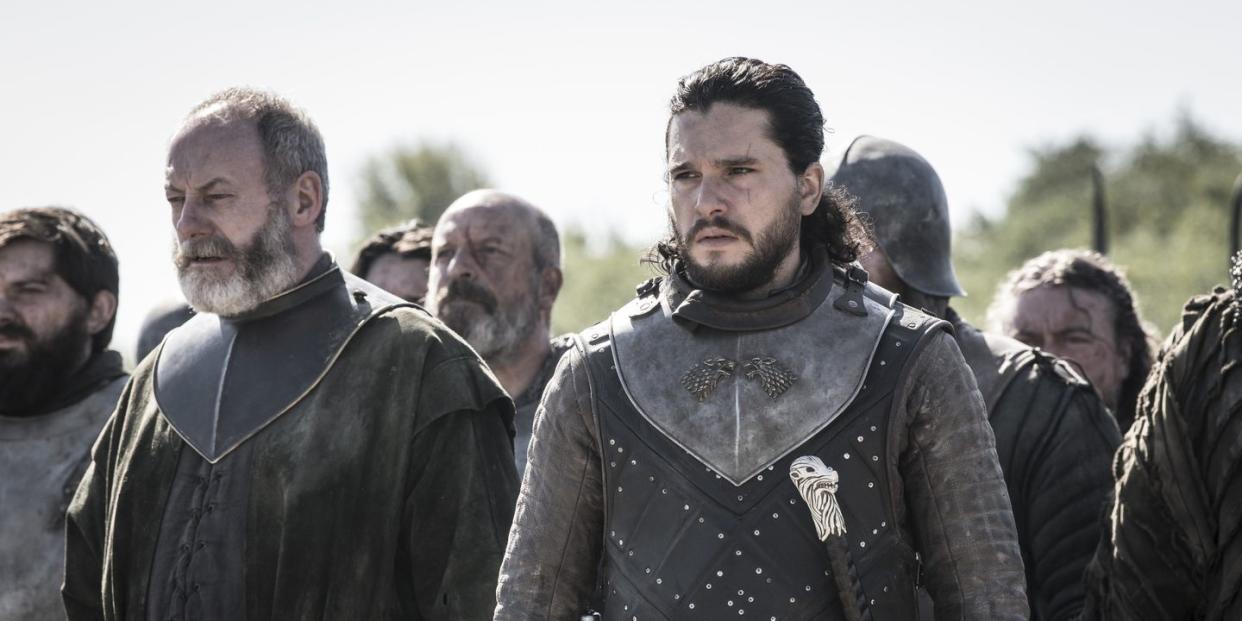Jon Snow Must Die in the 'Game of Thrones' Finale

Wow. Good for Jon Snow. It seemed like no one was working harder to die in Game of Thrones Season Eight than Jon Snow. I mean the doofus looked a dragon dead in the eyes and screamed at it. He participated in such idiotic battle strategies as: Fall Off the Dragon, Operation Capture a Wight, and Boy Bait. He wandered through battles like an idiot in Winterfell and King's Landing. He stupidly doubled down on his love for his aunt shortly before she torched an entire city as everyone warned him she might do. Plus, it seemed like Game of Thrones was primed for another shocking death and would kill its main protagonist in the first episode of the final season.
Yet, despite being phenomenally dumb, and subverting the Game of Thrones tendency for killing its heroes, he's made it to the final episode of this series. As many predicted she might, the Targaryen nature came out in Daenerys and she chose to completely level King's Landing with her dragon. In Episode Five, Jon-along with the audience-watched in horror at the destruction Dany wrought on the innocent people of this city.
Going into the final episode we have a clear conflict in front of us. Tyrion and Jon and Arya and Sansa-and everyone else left alive who's not a total monster-must work to stop Daenerys, the Mad Queen.
But that doesn't mean Jon Snow deserves to survive the series and end up on the Iron Throne like everyone arounds him wants.
If Game of Thrones wants to end its eight seasons in a way that does justice to a series that shocked and horrified and angered its fans, Jon Snow must die. If Game of Thrones wants this finale to satisfy, to challenge, to surprise its millions of die-hard viewers, Jon Snow must die. If Game of Thrones wants to avoid cliche and provide an emotionally gratifying experience, Jon Snow must die. If Game of Thrones wants to pay off two decades of books and TV and intricate writing, of prophecies, of clues, of vision-Jon Snow must die.
In Episode Nine of Season Six, Jon Snow is preparing for the Battle of the Bastards. "If I fall," he tells Melisandre, who resurrected him from death after he was betrayed by his Night's Watch brothers. "Don't bring me back."
"I'll have to try ... I serve the Lord of Light. I do as he commands," Melisandre says. "If the Lord didn't want me to bring you back, how did I bring you back? I have no power. Only what he gives me. And he gave me you."
"Why?" Jon asks.
"I don't know," she responds.
In the second episode of that season, Melisandre brings Jon back from the dead in a move that, at the time, felt like fan service. After six seasons of central protagonists getting murdered, by Season Five Jon had emerged at long last as the hero of Game of Thrones. Then in that season finale, he was murdered before he could unite the north to fight the looming threat of the White Walker army. It felt like another Ned Stark moment, another Red Wedding, another classic Game of Thrones slaying of the hero. Fans were convinced this one couldn't stick. Jon Snow must return to finish what he started.
And, of course, he did. Having passed its source material-George R.R. Martin's A Song of Ice and Fire-Jon Snow's fate was in HBO writers now. They brought Jon Snow back, where he's since become the classic fantasy hero that Game of Thrones never had or needed.
Then going into Season Eight, it felt like Game of Thrones had settled into a pretty typical fantasy narrative, he, hand-in-hand with his lover/aunt Daenerys Targaryen, appeared to be the two protagonists to root for in the upcoming battle between the living and the dead.
That set-up felt surprisingly unlike the Game of Thrones fans knew for five seasons. Here we had clear good and clear evil, clear heroes and clear villains. The HBO writers brought Jon Snow back for this very reason, to create a simple and palatable conclusion for the millions of fans Game of Thrones had accrued. And within the story, The Lord of Light brought Jon Snow back for a similar reason: To do ... something?

What that something was is not yet clear. Fundamentally, he's done almost nothing at all in this season unless you count screaming at the dragon.
That purpose must be fulfilled in the final episode of Season Eight to give fans any sort of closure. I had originally thought that Jon Snow's purpose was to be sacrificed so Daenerys could kill the Night King, thus fulfilling the Azor Ahai theory. But, it seems like throughout Season Eight, this show has forgotten about all those theories and prophecies that GRRM baked into his novels that the show's writers had hinted at, that fans have obsessed over.
No prophecy was fulfilled to kill the Night King. Cersei's Valonqar prophecy being fulfilled in her death is debatable at best.
So, is it possible that these prophecies don't have anything to do with the Night King, and in fact the great evil that the Azor Ahai is meant to defeat is actually Daenerys?
That would be an interesting twist, one that fans certainly didn't see coming. To put Jon Snow on the Iron Throne would be an extremely predictable and un-Game of Thrones thing to do. So is there an opportunity for the show to still provide a payoff for all these prophecies while at the same time giving a shocking Game of Thrones ending?
There could be by killing Jon Snow.
So, let's go back to Melisandre's Lord of Light. In Chapter 10 of A Clash of Kings, we hear the Azor Ahai prophecy in full:
There will come a day after a long summer when the stars bleed and the cold breath of darkness falls heavy on the world. In this dread hour a warrior shall draw from the fire a burning sword. And that sword shall be Lightbringer, the Red Sword of Heroes, and he who clasps it shall be Azor Ahai come again, and the darkness shall flee before him.
In that same book, Salladhor Saan explains how Lightbringer was first forged. It took three tries, and on the third try he drove it through his wife Nissa Nissa, and “her blood and her soul and her strength and her courage all went into the steel.”
Sacrifice, according to this prophecy, is the key to defeating the darkness in the realm's time of dread. And though audiences have long assumed Jon Snow to be Azor Ahai, the show pretty bluntly hinted that this was not the case back in Season Seven. In one clunky scene, Missandei points out that in High Valyrian, the word prince is actually gender-neutral, which means, you guessed it, that The Prince That Was Promised could be either a man or a woman.
Is it possible that The Prince That Was Promised is neither Jon Snow nor Daenerys Targaryen? Is it possible that Jon Snow sacrifices himself so Arya or Sansa or Tyrion kills Daenerys and rids the world of another tyrant?
With this, Jon Snow would accomplish the only thing that has driven him since he first fought a Wight in Season One Episode Eight. Dying for the cause, with honor, as a hero, is the only way Jon Snow can win. And if we're to consider another driving factor in Jon's life-to be accepted in his Stark family-dying with honor is the most Stark thing he can do. Just look at Ned Stark's ending.
('You Might Also Like',)

